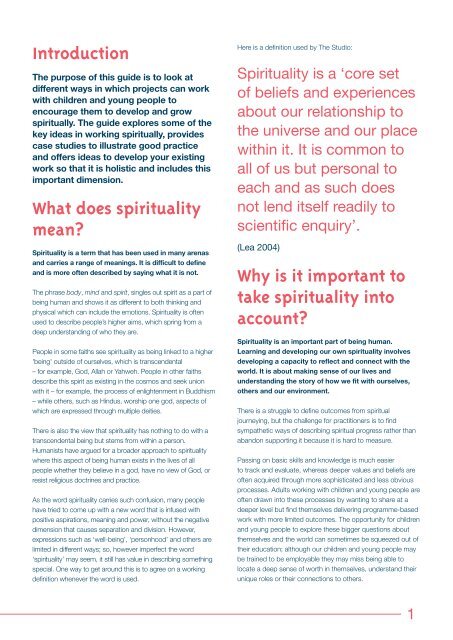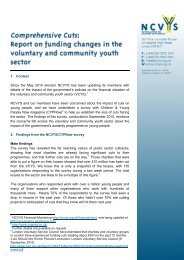How to help young people explore and develop their spirituality
How to help young people explore and develop their spirituality
How to help young people explore and develop their spirituality
You also want an ePaper? Increase the reach of your titles
YUMPU automatically turns print PDFs into web optimized ePapers that Google loves.
Introduction<br />
The purpose of this guide is <strong>to</strong> look at<br />
different ways in which projects can work<br />
with children <strong>and</strong> <strong>young</strong> <strong>people</strong> <strong>to</strong><br />
encourage them <strong>to</strong> <strong>develop</strong> <strong>and</strong> grow<br />
spiritually. The guide <strong>explore</strong>s some of the<br />
key ideas in working spiritually, provides<br />
case studies <strong>to</strong> illustrate good practice<br />
<strong>and</strong> offers ideas <strong>to</strong> <strong>develop</strong> your existing<br />
work so that it is holistic <strong>and</strong> includes this<br />
important dimension.<br />
What does <strong>spirituality</strong><br />
mean?<br />
Spirituality is a term that has been used in many arenas<br />
<strong>and</strong> carries a range of meanings. It is difficult <strong>to</strong> define<br />
<strong>and</strong> is more often described by saying what it is not.<br />
The phrase body, mind <strong>and</strong> spirit, singles out spirit as a part of<br />
being human <strong>and</strong> shows it as different <strong>to</strong> both thinking <strong>and</strong><br />
physical which can include the emotions. Spirituality is often<br />
used <strong>to</strong> describe <strong>people</strong>’s higher aims, which spring from a<br />
deep underst<strong>and</strong>ing of who they are.<br />
People in some faiths see <strong>spirituality</strong> as being linked <strong>to</strong> a higher<br />
'being' outside of ourselves, which is transcendental<br />
– for example, God, Allah or Yahweh. People in other faiths<br />
describe this spirit as existing in the cosmos <strong>and</strong> seek union<br />
with it – for example, the process of enlightenment in Buddhism<br />
– while others, such as Hindus, worship one god, aspects of<br />
which are expressed through multiple deities.<br />
There is also the view that <strong>spirituality</strong> has nothing <strong>to</strong> do with a<br />
transcendental being but stems from within a person.<br />
Humanists have argued for a broader approach <strong>to</strong> <strong>spirituality</strong><br />
where this aspect of being human exists in the lives of all<br />
<strong>people</strong> whether they believe in a god, have no view of God, or<br />
resist religious doctrines <strong>and</strong> practice.<br />
As the word <strong>spirituality</strong> carries such confusion, many <strong>people</strong><br />
have tried <strong>to</strong> come up with a new word that is infused with<br />
positive aspirations, meaning <strong>and</strong> power, without the negative<br />
dimension that causes separation <strong>and</strong> division. <strong>How</strong>ever,<br />
expressions such as ‘well-being’, ‘personhood’ <strong>and</strong> others are<br />
limited in different ways; so, however imperfect the word<br />
‘<strong>spirituality</strong>’ may seem, it still has value in describing something<br />
special. One way <strong>to</strong> get around this is <strong>to</strong> agree on a working<br />
definition whenever the word is used.<br />
Here is a definition used by The Studio:<br />
Spirituality is a ‘core set<br />
of beliefs <strong>and</strong> experiences<br />
about our relationship <strong>to</strong><br />
the universe <strong>and</strong> our place<br />
within it. It is common <strong>to</strong><br />
all of us but personal <strong>to</strong><br />
each <strong>and</strong> as such does<br />
not lend itself readily <strong>to</strong><br />
scientific enquiry’.<br />
(Lea 2004)<br />
Why is it important <strong>to</strong><br />
take <strong>spirituality</strong> in<strong>to</strong><br />
account?<br />
Spirituality is an important part of being human.<br />
Learning <strong>and</strong> <strong>develop</strong>ing our own <strong>spirituality</strong> involves<br />
<strong>develop</strong>ing a capacity <strong>to</strong> reflect <strong>and</strong> connect with the<br />
world. It is about making sense of our lives <strong>and</strong><br />
underst<strong>and</strong>ing the s<strong>to</strong>ry of how we fit with ourselves,<br />
others <strong>and</strong> our environment.<br />
There is a struggle <strong>to</strong> define outcomes from spiritual<br />
journeying, but the challenge for practitioners is <strong>to</strong> find<br />
sympathetic ways of describing spiritual progress rather than<br />
ab<strong>and</strong>on supporting it because it is hard <strong>to</strong> measure.<br />
Passing on basic skills <strong>and</strong> knowledge is much easier<br />
<strong>to</strong> track <strong>and</strong> evaluate, whereas deeper values <strong>and</strong> beliefs are<br />
often acquired through more sophisticated <strong>and</strong> less obvious<br />
processes. Adults working with children <strong>and</strong> <strong>young</strong> <strong>people</strong> are<br />
often drawn in<strong>to</strong> these processes by wanting <strong>to</strong> share at a<br />
deeper level but find themselves delivering programme-based<br />
work with more limited outcomes. The opportunity for children<br />
<strong>and</strong> <strong>young</strong> <strong>people</strong> <strong>to</strong> <strong>explore</strong> these bigger questions about<br />
themselves <strong>and</strong> the world can sometimes be squeezed out of<br />
<strong>their</strong> education; although our children <strong>and</strong> <strong>young</strong> <strong>people</strong> may<br />
be trained <strong>to</strong> be employable they may miss being able <strong>to</strong><br />
locate a deep sense of worth in themselves, underst<strong>and</strong> <strong>their</strong><br />
unique roles or <strong>their</strong> connections <strong>to</strong> others.<br />
1



